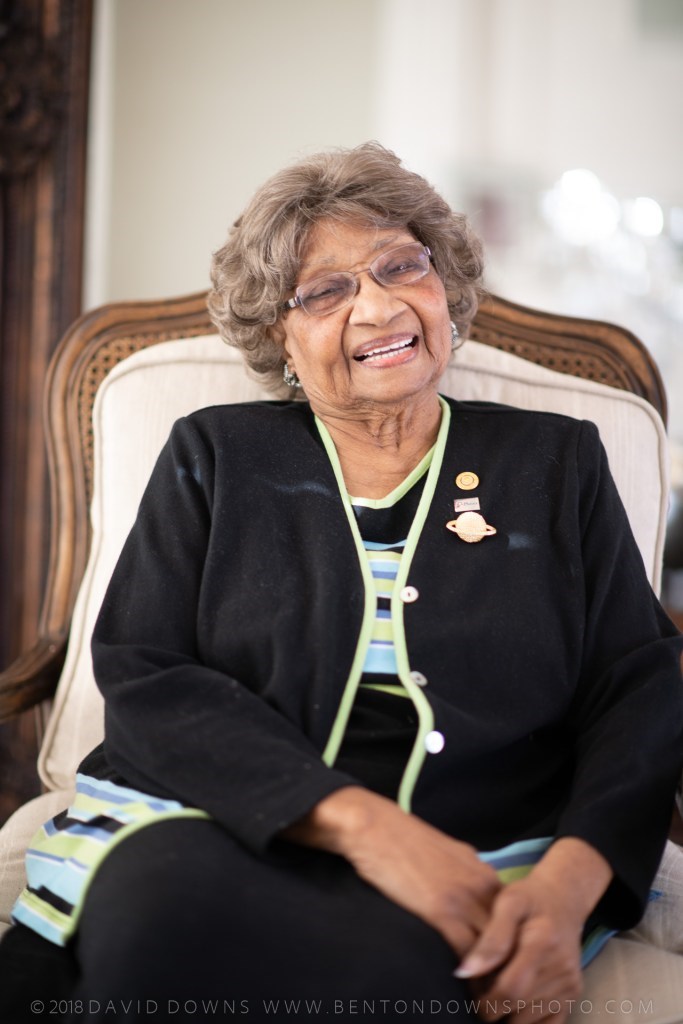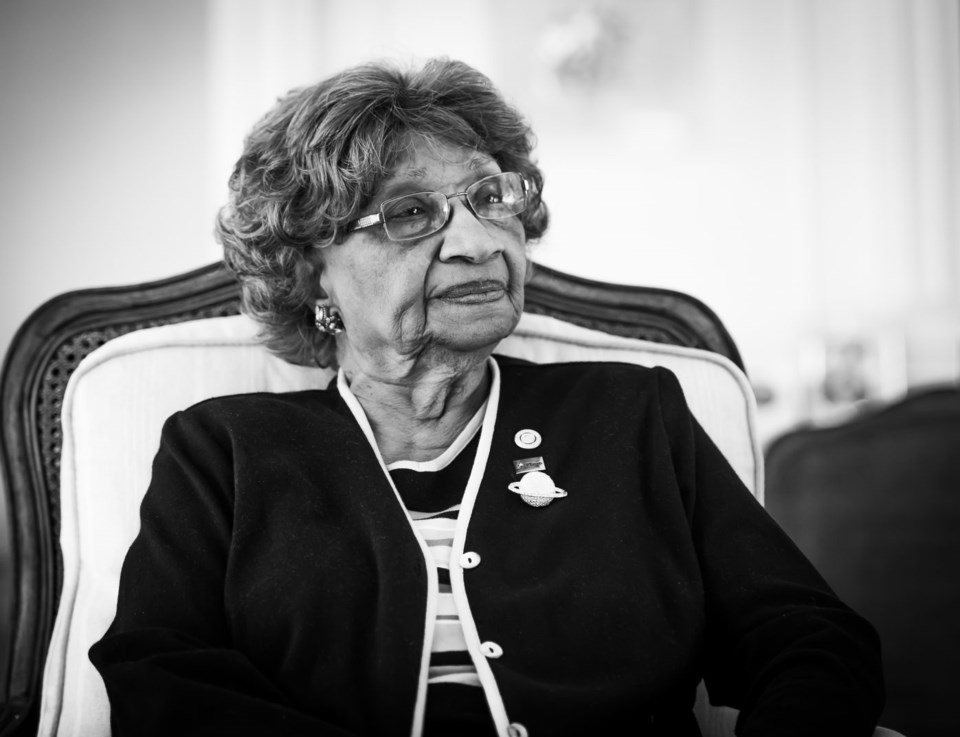When Dr. Myrtle Hightower was growing up in Fort Gibson, Oklahoma, she didn’t know what segregation was. It’s not that she was exempt from it, but rather that it was her version of normalcy. Born in the early 1920s, Myrtle and her family lived on a 200-acre farm where they raised cattle, hogs, turkeys and chickens. They grew vegetables and gave food to their neighbors—an Indian family, a German family, a white family and a black family. They were all friends and the children played with each other. Myrtle knew that her family couldn’t use specific water fountains and public restrooms, but her parents never made it seem like a big deal. When she and her siblings walked three and a half miles to school every day, they smiled and waved as the bus full of white students drove by.
Myrtle was raised by parents who she describes as very kind and very strong, and who wanted their five children to be the same way. Her father didn’t allow them to say the word “can’t” and insisted that they look up with their shoulders back when they spoke to anyone. On Saturday nights, Myrtle attended church with her family. Rooted in their Christian faith, her parents constantly counseled their children about generosity and the importance of treating other people with respect and kindness despite any differences. They taught life lessons that Myrtle still quotes word-for-word:
“You see how the dogs and cats get along? They don’t fight. We don’t either.”
Myrtle was a tomboy and loved to play outside. Her hair was always styled in two braids and she wore dresses that her mother made from the most colorful flour bags she could find. One Friday evening when Myrtle was about 12 years old, she was playing on a pile of wood stacked on their land when she fell and broke her right arm in two places. She had to wait for six days to get examined by a medical professional because the doctor that treated black people only came to their small town on Thursdays. Her parents tried splinting, wrapping, and icing her arm in the interim, but the large amount of time that elapsed between the accident and the receipt of medical treatment left permanent damage; at 95 years old, Myrtle’s arm still hurts her today.
Read more: Plano leaders talk diversity in the workplace at Toyota
Education has always been a focal point in Myrtle’s life. Her parents put all their children through college and encouraged them to go as far as they could with their schooling. Myrtle began college at age 15 with aspirations of becoming a doctor or a librarian; she had always been good at math and science, but she loved children and books, too. In her steadfast quest for knowledge, she obtained three degrees, including a master’s degree from Northeastern State University, as well as a doctorate degree from the University of Cincinnati. She also holds library and teaching certifications.
Myrtle once heard a professor at Moorehouse College in Atlanta, Georgia say, “We started in this race behind. Therefore, it is incumbent on us to run fast in order to catch up.” She has always been motivated by this sentiment.
“I have always tried to run fast,” Myrtle says.
Myrtle began her education career during segregation in Oklahoma where she spent 25 years teaching high school students, wearing suits to work nearly every day of her career. On May 17, 1954, the United States Supreme Court issued its landmark decision in Brown vs. Board of Education which ruled that school segregation was unconstitutional. Selection committees began to poll teachers from “black schools” about their teaching styles, mannerisms and experience as they searched for black teachers to hire at “white schools.”
Read more: Soraya Mangal talks diversity, inclusion, and life as a Georgia peach
Myrtle was hired as a counselor at Will Rogers High School in Tulsa, Oklahoma where she felt generally accepted and appreciated. The school hosted small meetings to discuss progress and goals, and sometimes invited parents to attend. The change wasn’t easy, but people at Will Rogers seemed determined to make it work. Myrtle sometimes dealt with angry parents, like one mother who called her to complain that “black boys” were playing near her daughter, using an expletive and clearly not realizing that Myrtle, too, was black. Myrtle calmly thanked the woman for the information but told her that they didn’t use those words at the school.
Eventually Myrtle moved to Collin County where she was welcomed with open arms. She worked as a counselor in McKinney ISD and later became the diversity counselor for Plano ISD where she worked for more than 30 years and introduced countless diversity programs and initiatives, including starting the school district’s first diversity committee.
“I don’t believe in a ‘no’ answer for anything,” Myrtle says.
In the Plano community, Myrtle put on countless events to support inclusion, like the Plano Community Forum Martin Luther King, Jr. (MLK) Day Annual Breakfast, now in its 35th year. The free event, hosted by the Collin College Board of Trustees, celebrates the legacy of MLK with speakers and roundtable discussions about equality, progress and goals for the future. In recognition of her work on the event, Myrtle was awarded the Drum Major for Justice award, which was established by Dr. King to recognize individuals who dedicate their lives to community service.
“Plano is an excellent city with an excellent school district,” Myrtle says. She is proud that of the thousands of elementary schools in the state of Texas, John and Myrtle Hightower Elementary School (the namesake of Myrtle and her husband) has been ranked in the top 10 for years.
Myrtle’s impact on the community is so large that it’s hard to measure. She constantly meets people who she has impacted deeply, sometimes even without her knowledge. One year when she went to vote in a local election, she rolled down the window of her car and told an employee of the facility that she couldn’t get out of her vehicle because it was difficult for her to walk. She stated her name and asked for the voting box to be brought out to her, and when it was, the woman carrying it began to cry. With her head resting on her arms that she’d folded on the open window of Myrtle’s car, the woman thanked her for helping her son and the rest of the students in the community. Myrtle’s eyes welled up with tears, too.
Myrtle retired in 2016, but she seems busier than ever. She is one of the most well-known volunteer community leaders in Collin County and has her hand in just about everything; Myrtle has been on the committees of the Plano Housing Board, the Plano Library Foundation, the Plano Board of Adjustment, the Plano Community Charity, and more. She is devoted to public service with a special emphasis on diversity, giving her time and stamp of approval to countless initiatives that make inclusion a top priority. She has accumulated an impressive number of awards for her community service and diversity initiatives over the years. Among many others, she has been named a Collin College Living Legend by the Collin College Foundation, and she received the Texas Hero for Children Award from The State Board of Education which recognizes excellence in advocacy for education, specifically related to contributions made to public school education in Texas. She was listed as one of Plano ISD’s 100 Heroes in 2017 and has even been named Citizen of the Year by the Plano Chamber of Commerce.
Despite all the improvements in our society in regard to race relations, there is still so much work to be done. As we continue to lose members of the generations that lived through segregation, we must build a pipeline of individuals who are motivated to carry the torch and become agents of change. At times it seems that our society is seething with hate, but Myrtle says we should look back to where we came from; our country has made significant strides toward equality, and we can do it again. She recognizes the discomfort and apprehension that can sometimes come with conversations about race, but she says we must have those discussions anyway.

According to Myrtle, all schools should have black and Hispanic counselors on their staff, and both high schools and colleges should have mandatory diversity orientations and classes. We also need more diversity programs in communities; Myrtle believes that starting small will yield a big impact. She’s proud of the accomplishments of black athletes who are taking stands as public figures and inspiring the youth in our country. She would like to see the number of black individuals voting increase drastically, and she says we need strong candidates to motivate them to do so. When she was a child, her parents never missed voting in an election; they were permitted to because they were landowners, and they voted rain or shine.
More than anything, Myrtle craves love for our world and everyone who lives in it.
“We’ve got to stop this hate,” Myrtle says of the tension in today’s society. “We’ve got to do something. Because we’re going backwards.”
In her spare time, Myrtle enjoys organizing community events and attending services at Hill Chapel C. M. E. Church where she has also organized three banquets. She has a daughter named Bessie, two grandchildren, and five great-grandchildren. She often quotes people she admires, and she tries to live a life that exudes the wisdom from the advice she hears. One of her favorite, said by Booker T. Washington, says: “Cast down your bucket where you are.”
“So as I cast down my bucket here in Plano, I feel that I have made some small progress. I feel that I have helped people by showing them a path to love and acceptance.”




![Top 5 Reads Of The Week [August 18 - 22]](https://www.vmcdn.ca/f/files/localprofile/images/food-and-drink/img_7561-2.jpg;w=120;h=80;mode=crop)